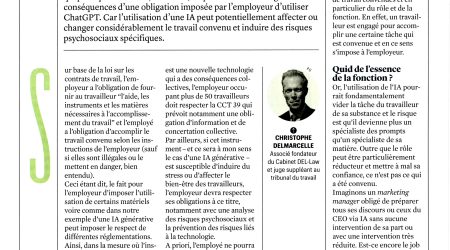The employer has the right to unilateraly amend the terms of the hospitalisation insurance (Echo 9-11-2021)
Posted the 11 December 2021The employer's right to amend hospitalisation insurance, or when unions claim victory while losing on the essential points… Fortunately!
On October 27, the Dutch-speaking Labour Court of Brussels issued a landmark decision in a highly sensitive and rarely litigated matter: the unilateral amendment of a hospitalisation insurance (HI) plan.
In 2016 and 2018, a U.S. company faced premium increases imposed by DKV (+15% in 2016 and +10% in subsequent years) due to a surge in claims. To sustain the plan, the company decided to make minor changes to its HI design. A deductible was introduced for outpatient expenses, and the intervention cap was reduced from €2,500 to €1,250.
Thirty-five employees took legal action, arguing that HI is a form of remuneration and therefore cannot be modified by the employer. They demanded the reinstatement of the previous plan retroactively.
The Labour Tribunal dismissed their claim entirely, confirming that the conditions of the HI plan (deductibles, caps, covered illnesses, etc.) were not contractual in this case. This was due to the absence of references in the employment contract, appendices, or other contractual documents, and because the plan brochures explicitly stated they were non-contractual and that the employer had the right to amend the plan. The court held that while participation in HI is contractual and remunerative, this does not mean that all plan conditions are contractual. Therefore, the company had the right to unilaterally modify them.
The Labour Court upheld this point, rejecting the employees’ primary claim to reinstate the old plan. And this is fortunate!
Unlike a group insurance plan (GI), with HI, the employer has no control over escalating costs and must deal with an insurer unwilling to incur losses. Following the employees' reasoning—denying employers the right to adjust the plan—would leave employers at the mercy of uncontrollable increases or, in cases of refusal, lead to the insurer terminating the plan.
A victory for the unions on this point would have been detrimental to employees. Employers would have been forced to abandon collective HI plans, potentially contributing instead to an individual plan subscribed to by employees—thus avoiding uncontrollable financial risks. Employees would lose out on pricing and the benefits of collective risk sharing. Farewell to solidarity…
The Court confirmed that the company did indeed have the right—contrary to union claims—to amend the plan and can continue to do so in the future. Its only contractual obligation is to provide an HI plan.
However, the Court ruled that changes to the plan's design cannot result in a reduction of employer-paid premiums, as occurred in 2016, and ordered compensation for the difference. The Tribunal had previously held that if the plan's design and conditions were not contractual, neither were the premiums, and it rejected this claim.
The Court overlooked the fact that HI premiums, unlike GI premiums, are never paid to the employee, provide coverage for contingencies, and are inherently tied to the plan’s design. Accepting that the employer has the right to amend the plan while forbidding premium adjustments is inconsistent. Another inconsistency: if the insurer reduces its rates or if there is a change of insurer with reduced premiums under identical conditions, this ruling would require the employer to compensate employees… even if the plan remains unchanged!
The clear confirmation of the employer’s right to unilaterally amend the design and terms of a non-contractual HI plan remains a significant achievement. While the employees ultimately won on the subsidiary point of premium reduction, it is a Pyrrhic victory.
An employer faced with a demand for higher premiums from the insurer, to avoid being permanently subject to them, can—unless employees agree to bear the cost—instead amend the plan to make it less costly, thereby preventing the insurer from applying the increase.
L'Echo, 9-11-2021
Related articles

Is an employer allowed to mandate the use of artificial intelligence tools by employees ? (Trends, 17-07-2025)

Caution if a former colleague opposed to your employer asks you to testify in their favor
